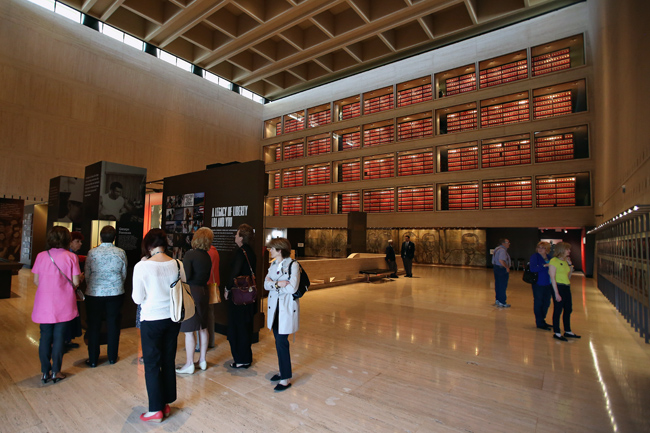For the Civil Rights Summit in April, the LBJ Presidential Library and Museum has introduced the “Cornerstones of Civil Rights,” an exhibit that includes the original Civil Rights Act of 1964 and Voting Rights Act of 1965, both signed by President Johnson.
“The cornerstone documents of civil rights are all in one place for the first time ever,” said Anne Wheeler, communications director for the library.
According to Wheeler, the museum underwent a $10 million redesign in 2012 to incorporate interactive technology into exhibits to reach more college students. Wheeler said the number of visitors, which is approximately 10,000 people per month, has increased since the renovation.
“What we want to do is present the story of LBJ and Lady Bird Johnson in contemporary terms,” Wheeler said. “A big part of our exhibit is about LBJ’s legacy and how it affects people today — because you wear a seatbelt in your car because of a law passed during the Johnson administration.”
Wheeler said the cost of recent technology renovations is the main reason the museum decided to begin charging admission in November 2013. The highest ticket price is $8 for adults while tickets for UT students, faculty and staff to remain free.
“We don’t really feel like what we’re asking for is out of line,” Wheeler said. “In fact, it’s much less than most museums.”
Wheeler said, since the museum began charging for admission, the staff is now able to track where visitors, mainly history-loving tourists, live by asking for their ZIP code when they purchase a ticket.
“We’ll have a pretty good feel, probably in about three or four months, [about] exactly where people are coming from,” Wheeler said. “[Before], it’s been sort of a guess.”
Susan Binford, assistant dean for communications for the LBJ School of Public Affairs, said the Civil Rights Summit is a partnership between the Presidential Library, the LBJ School of Public Affairs and the LBJ Foundation. Binford said the Summit will not only be a celebration of past achievements in civil rights but also a reflection on current issues, such as women’s rights, gay rights and immigration.
“How do we draw on LBJ’s legacy of getting things done?” Binford said. “The short amount of time it took for him to pass such monumental legislation is not seen today. We have an opportunity to empower a whole new generation.”
Elizabeth Dupont, history senior at Texas State University who works at the front desk of the museum, said the information the LBJ Presidential Library provides continues to be relevant because race relations in the U.S. are still not as optimal as they can be.
“The fact that he got this legislation passed in the climate that he did shows we can aim for better,” Dupont said.




















